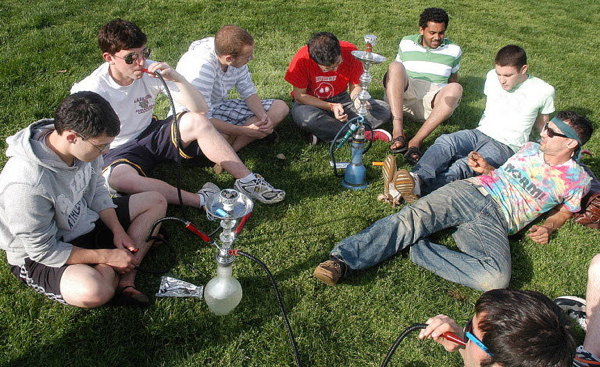 Our World
Our World  Our World
Our World  Technology
Technology 10 World-Changing Examples of Turning Dumb Technology into Smart Technology
 Pop Culture
Pop Culture Ten Celebrities Who Straight-Up Lied on Home Tours
 Animals
Animals 10 Remarkable Things We’ve Recently Learned about Animals
 Weird Stuff
Weird Stuff 10 Reasons the Psychic Internet Theory Will Blow Your Mind
 Movies and TV
Movies and TV Television’s Top Ten Most Ruthless Serial Killers
 Weird Stuff
Weird Stuff Ten of the Strangest Paraphilias Ever Documented
 Miscellaneous
Miscellaneous 10 Interesting Physics Facts about Bullets
 History
History 10 Oddest Naval Actions in History
 Music
Music 10 “Bands” That Are Actually Just One Person
 Our World
Our World 10 Crazy Facts about Cycads That Might Surprise You
 Technology
Technology 10 World-Changing Examples of Turning Dumb Technology into Smart Technology
 Pop Culture
Pop Culture Ten Celebrities Who Straight-Up Lied on Home Tours
Who's Behind Listverse?

Jamie Frater
Head Editor
Jamie founded Listverse due to an insatiable desire to share fascinating, obscure, and bizarre facts. He has been a guest speaker on numerous national radio and television stations and is a five time published author.
More About Us Animals
Animals 10 Remarkable Things We’ve Recently Learned about Animals
 Weird Stuff
Weird Stuff 10 Reasons the Psychic Internet Theory Will Blow Your Mind
 Movies and TV
Movies and TV Television’s Top Ten Most Ruthless Serial Killers
 Weird Stuff
Weird Stuff Ten of the Strangest Paraphilias Ever Documented
 Miscellaneous
Miscellaneous 10 Interesting Physics Facts about Bullets
 History
History 10 Oddest Naval Actions in History
 Music
Music 10 “Bands” That Are Actually Just One Person
Top 10 Ways College Makes You Dumb
Let’s go ahead and start by saying there’s nothing inherently wrong with college. The opportunity to receive a higher education is a privilege that many children don’t have, and there are at least dozens of ways college promotes intelligent thought and a deeper understanding of the way the world works. Just, not in these ways. Here are ten ways college makes you dumb.
SEE ALSO: Top 10 Ways to Seem Smarter than You Are

Reason: You’re Not As Smart In A Group
By necessity, college is a group learning institution. We don’t have the resources or the time to tutor every student individually, so we end up with classes of maybe twenty or thirty students. Often teachers will divide their classes into even smaller groups for different assignments, but research shows that working in small groups actually makes you less intelligent.
A study at the Virginia Tech Carilion Research Institute measured the IQ of participants and then divided them into groups of five. They then asked them to complete another series of tests, and found that their performance results dropped significantly. Why? The researchers believe that social status plays a huge role in the way our brains work, so when the participants had to focus on their social role in the group, even subconsciously, they weren’t able to focus as exclusively on the tasks at hand. They also believe this could come into play in the real world in business meetings, political groups (i.e. Congress), and school settings.

Reason: Sitting All Day Reduces Your Mental Capacity
According to this next study, you’re probably getting dumber just by reading this article (although granted, it could just be the terrible writing). Dr. James Levine of the Mayo Clinic has been conducting tests to see how extended periods of sitting affect an individual’s health, and the results don’t look good.
While the main focus of the study was see how inactivity affects weight gain, it turns out that sitting for a long time also affects your brain activity. He found that people who sit more than two hours a day have a massively decreased metabolic rate, a factor which is believed to be directly related to cognitive ability. Your brain uses glucose as fuel, which is created by the burning of calories. So sitting through four hours of classes or spending the whole night cramming for an exam might hit you with a lot of information, but gradually your brain loses its ability to process it effectively.

Reason: All That Multitasking Makes It Hard to Remember Anything
Who hasn’t tried to multitask in school or at work? A hectic class schedule will force any college student to try to save time by doing a few things at once—but it’s not helping as much as they might think. Clifford Nass and his research team conducted a series of tests to figure out how some people multitask while others struggle with it, and discovered that multitaskers are actually worse at just about everything.
Multitaskers, they found, had trouble sorting new information and then remembering it a short time later. For example, when they were shown a series of letters, they couldn’t point out when one letter was repeated. In another test, they had difficulty telling whether a number was even or odd, or whether a letter was a consonant or a vowel. The researchers believe that people who regularly multitask damage their ability to filter out irrelevant data, which makes it harder to concentrate on one single subject. So the next time you’re reading Listverse during a sociology lecture, you might want to just leave the classroom. You’ll learn more here anyway.

Reason: Even Jogging In Your College Town Makes You Dumber
Whether you’re working off stress after a hard day of classes or just running off that morning hangover, exercise is a great way to get those mental juices flowing. Unless, of course, you live anywhere near a city.
A new study shows that jogging in an urban environment—anywhere near pollution—can reduce your capacity for absorbing new information. Vrije Universiteit Brussel, a Belgian university, tested two groups of runners—those who exercised in the city and those who did their running in a rural environment—and found that the city dwellers had a lowered attention span and response time, which correlated with higher levels of air pollutants in their bloodstream after a one hour run.
But it’s not all bad – try running in the rain or on a windy day, which temporarily reduces pollution levels.

Reason: Your College Diet Kills Your Memory
College is many things, but it’s rarely an ideal environment to pick up healthy eating habits. The soda, the energy drinks, the late night frozen pizzas—all of those college staples might give you an immediate boost, but in the long run they’re absolutely murdering your memory.
High fructose corn syrup is a corn byproduct that is commonly (very commonly) used to sweeten food products. A research group at UCLA took a look at how rats who were given a diet high in HFCR were able to remember a maze, and found that after six weeks of drinking fructose water, they were underperforming in just about every possible way. According to the head researcher, Fernando Gomez-Pinilla, “Their brain cells had trouble signaling each other, disrupting the rats’ ability to think clearly and recall the route they’d learned six weeks earlier.”
The good news? The same study confirms that eating food with Omega-3s can help reverse some of the cognitive damage from high fructose corn syrup.

Reason: But Your Dorm’s Water Might Be Even Worse
While you’re tossing that six-pack of soda in the trash, you might want to go ahead and turn off all your plumbing—because your tap water might be making you stupid too. Conspiracy theorists will be happy to learn that a new 2012 study confirms the relationship between high concentrations of fluoride in water and lower intelligence.
The researchers analyzed data from twenty-seven previous studies that took into account varying levels of fluoride exposure across different geographic regions, and found that in every single case, children in areas with high fluoride concentrations had a remarkably lower IQ. Granted, it’s believed that fluoride is most harmful for younger children whose brains are still developing, but there are also very few studies so far on fluoride in adults—unless you count the various animal studies where it pretty much always kills them.

Reason: Stress Makes It Harder For Your Brain To Deal With Stress
Stress is a normal part of college life – you’re on your own for the first time, your future depends on your grades, and it all sort of builds up into this constant presence, lurking behind everything you do. Unfortunately, just being in that kind of environment makes it harder for you to respond to stressful situations.
The Yale Stress Center worked with 100 participants who had gone through a stressful event in the past, and found that the more stress they had been through, the smaller their prefrontal cortexes were. The prefrontal cortex is the area of the brain responsible for impulse control and emotional stability, and it also plays an important part in our ability to learn from experiences—so instead of learning from the stress, we end up managing it even worse the next time we’re stressed.
The study also found that stress reduces the number of neurons in the brain, making it harder for the brain to communicate and store new information.

Reason: Shifting Sleep Schedules Makes You Twice As Dumb
As if the stress wasn’t bad enough already, all those late nights and too-early mornings could be making you permanently stupid. The study, done by the University of California, Berkley, looked at how shifting sleep schedules affected hamsters. The result—the hamsters began producing fifty percent fewer neurons after a month of having their sleep schedule changed by six hours every few days. Some of them couldn’t even find their exercise wheel.
Even worse, the hamsters retained the mental decline for nearly a month after they went back to a regular sleep schedule, showing that messing with your sleep schedule too often can have long term effects. The study compared the results to jet lag, but in effect it’s no different than a cycle of staying up until dawn a few nights in a row, and then shifting back to sleeping through the night. But if you really have to study for that test, you can always try taking some Viagra.

Reason: Yeah, Weed Too
Apparently, marijuana makes you stupid. Specifically, long-term use can cause a range of cognitive problems. It’s hard to study the long term effects of any drug, but the Dunedin Study did a fairly thorough job. Researchers followed over 1,000 people from birth until the age of thirty-eight. They tested the participants on cognitive abilities at age thirteen, presumably before any marijuana use, and then again at intervals for the next twenty-five years, comparing the results of the participants who admitted to frequent use against those who didn’t smoke.
They found that persistent marijuana use led to an increase in neuropsychological issues, especially among those who had started smoking while they were teenagers. Now, by putting this entry on here we’re not making some statement about how all college kids are potheads, but come on, they totally are.

Reason: Lectures Can Impair Your Ability To Reason
Statistically speaking, most of college is spent listening to someone else talk. It’s how we learn. But ironically, that very situation might make it harder for you to make intelligent decisions. A research team at the Atlanta based Emory University used fMRI brain scans to see how twenty-four people responded to financial opportunities. Some of the time they were given advice from an “expert,” and other times they received no advice.
Almost without fail, the participants blindly accepted the so-called expert’s advice, even if it meant there was a higher risk involved. When they weren’t given any advice, the brain scans showed that they were more involved in calculating the risk versus reward on their own, forming their own judgement.
But hey, not all aspects of college are bad. At least they’re not lying to you, right?








